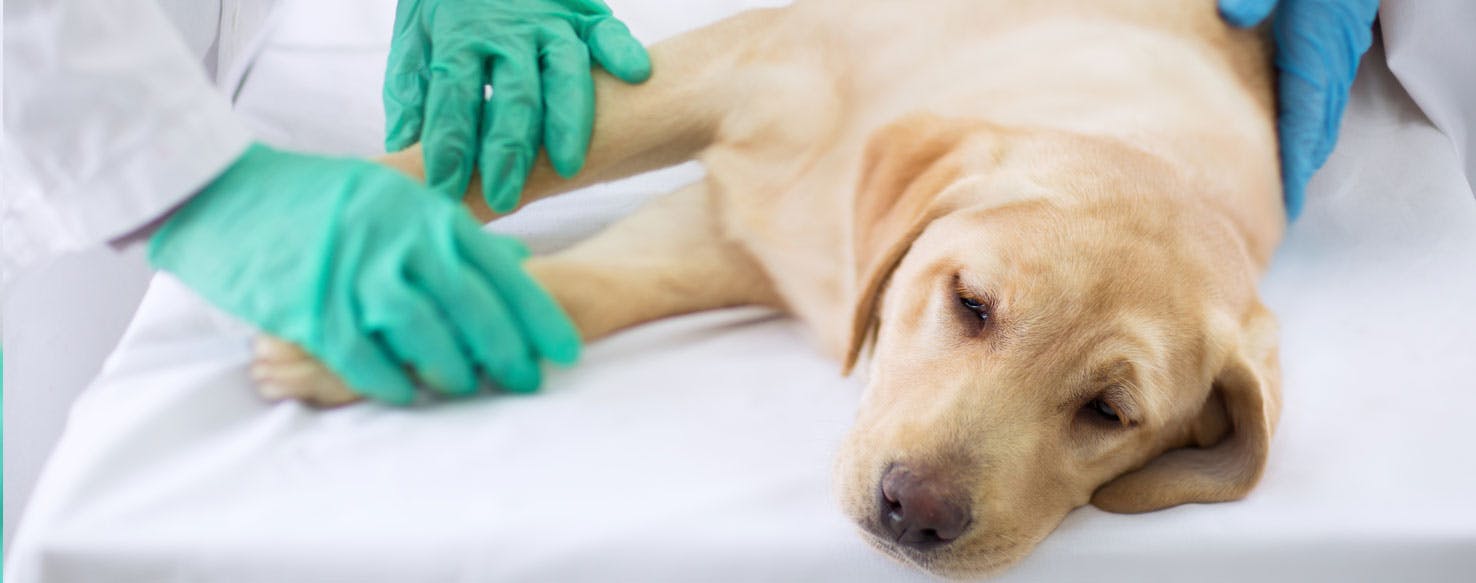- Home
- The Daily Wag!
- Senses
- Can Dogs Be Born With Parvo?

Parvo is a highly contagious disease that occurs in dogs, which can cause weight loss, vomiting, and may even lead to death. It can be passed to your puppy through the touching of a contaminated object or dog, either directly or indirectly, before your new buddy has had the chance to be vaccinated.
Unfortunately, there is also the chance that your puppy has been born to a litter whose mother was not vaccinated. While this may sound scary, there are ways to look out for the signs and symptoms of parvo, and if caught in time, your pupper has a chance at a full recovery.
While parvo is highly contagious and very serious, puppies born with parvo have a chance at a long, healthy, and fun-filled life, so long as it is caught early enough. That's why it's extremely important that all new owners know what to look for in their new buddy, regardless of whether the puppy was born with parvo, or whether the disease was contracted before/while you've got your pooch. These symptoms will be the same regardless of whether or not your pup was born with parvo.
Parvo infects you doggie's tummy and intestinal tract. As a result, in terms of body language, your precious pup will show their discomfort through things like whining, avoiding interaction, listlessness, and lethargy. They may even cry when their stomach or abdomen is touched.
Basically, your puppy won't show it's usual puppy spunk and excitement. Because it can't tell you it's in pain with its words (although we all wish our doggos could talk!), your BFF will try to tell you they aren't feeling well with their body language. So make sure you pay attention if your little guy is acting differently!
Body Language
These are the general body language signs your dog may show due to the stomach pain that parvo causes:
- Whining
- Cowering
- Panting
- Ears Drop
- Weakness
Other Signs
These are medical symptoms your dog may show if they have parvo. Keep in mind that there are other illnesses that have similar symptoms, but it's always best to get your dog tested by your vet if you are unsure.
- Lack Of Appetite And Severe Weight Loss
- Vomiting
- High Fever
- Dehydration
Parvo, or canine parvovirus, is a virus that can infect any dog or puppy which comes in two forms: intestinal or cardiac.
The first attacks the GI tract of a dog, while the second attacks a dog's heart muscles. While it can occur in adult dogs, the most common instances of parvo seen in vet's offices are pups between six weeks and six months old. This is primarily because these doggos have yet to be vaccinated against the disease.
Puppies can be born with parvo if their mother has parvo or was never vaccinated against the disease. Unfortunately, not only is it a very serious disease, but it is also extremely easy to transmit. Your puppy, or your puppy's mother, can contract parvo just by touching something that is contaminated. It is particularly more common in litters of Rottweilers, Doberman Pinschers, Pitties, English Springer Spaniels, German Shepherds, and Labs.
Luckily, the advancements in the fight against parvo have been relatively successful. Once properly vaccinated, your pupper will be almost completely protected against the disease. Additionally, while there is no technical cure to parvo, once identified, vets will usually put your fluffy buddy on antibiotics to help combat the deadly symptoms of the disease.
Once your little fighter has beaten parvo, they are usually only contagious for 10 more days. Then, once checking in with your vet, your little guy is free to go explore the world and make new friends!
Have questions or concerns about your pet?
Chat with a veterinary professional in the Wag! app 24/7.
Get Vet ChatHow You Can Help Your Puppy Avoid Parvo
- Get your puppy vaccinated! Try to keep exposure to other dogs to a minimum until your doggo is at least 14-16 weeks of age.
- Know the symptoms! By knowing the symptoms, you can save your pupper from an extended battle against this horrible disease
- Talk to your vet! Your vet will know better than any blog out there the dangers of contracting parvo, how to socialize your dog without risk, and when to vaccinate.
- If you know another dog that has parvo, try to avoid areas frequented by that pupper. By avoiding these places, you can avoid your own contamination, so you can go home and show your own little guy the love he deserves!
- Ask your breeder or adoption agency if the mother of your doggo was vaccinated against parvo, or if any other dogs in the litter have had issues. The more you know, the less you'll have to worry!
Written by Katherine McCormick
Veterinary reviewed by:
Published: 01/25/2018, edited: 04/06/2020
More articles by Katherine McCormick

